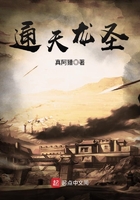'Listen!' I said. 'Get on to your headquarters. Tell them that it's all up with us if a single plane gets back. Let them get well over the line, the deeper in the better, and tell them to send up every machine they possess and down them all. Tell them it's life or death. Not one single plane goes back. Quick!'
Archie disappeared, and as he went our anti-aircraft guns broke out. The formation above opened and zigzagged, but they were too high to be in much danger. But they were not too high to see that which we must keep hidden or perish.
The roar of our batteries died down as the invaders passed westward. As I watched their progress they seemed to be dropping lower. Then they rose again and a bank of cloud concealed them.
I had a horrid certainty that they must beat us, that some at any rate would get back. They had seen thin lines and the roads behind us empty of supports. They would see, as they advanced, the blue columns of the French coming up from the south-west, and they would return and tell the enemy that a blow now would open the road to Amiens and the sea. He had plenty of strength for it, and presently he would have overwhelming strength. It only needed a spear-point to burst the jerry-built dam and let the flood through ... They would return in twenty minutes, and by noon we would be broken. Unless - unless the miracle of miracles happened, and they never returned.
Archie reported that his skipper would do his damnedest and that our machines were now going up. 'We've a chance, sir,' he said, 'a good sportin' chance.' It was a new Archie, with a hard voice, a lean face, and very old eyes.
Behind the jagged walls of the farm buildings was a knoll which had once formed part of the high-road. I went up there alone, for Ididn't want anybody near me. I wanted a viewpoint, and I wanted quiet, for I had a grim time before me. From that knoll I had a big prospect of country. I looked east to our lines on which an occasional shell was falling, and where I could hear the chatter of machine-guns. West there was peace for the woods closed down on the landscape. Up to the north, I remember, there was a big glare as from a burning dump, and heavy guns seemed to be at work in the Ancre valley. Down in the south there was the dull murmur of a great battle. But just around me, in the gap, the deadliest place of all, there was an odd quiet. I could pick out clearly the different sounds. Somebody down at the farm had made a joke and there was a short burst of laughter. I envied the humorist his composure.
There was a clatter and jingle from a battery changing position. On the road a tractor was jolting along - I could hear its driver shout and the screech of its unoiled axle.
My eyes were glued to my glasses, but they shook in my hands so that I could scarcely see. I bit my lip to steady myself, but they still wavered. From time to time I glanced at my watch. Eight minutes gone - ten - seventeen. If only the planes would come into sight! Even the certainty of failure would be better than this harrowing doubt. They should be back by now unless they had swung north across the salient, or unless the miracle of miracles -Then came the distant yapping of an anti-aircraft gun, caught up the next second by others, while smoke patches studded the distant blue sky. The clouds were banking in mid-heaven, but to the west there was a big clear space now woolly with shrapnel bursts. Icounted them mechanically - one - three - five - nine - with despair beginning to take the place of my anxiety. My hands were steady now, and through the glasses I saw the enemy.
Five attenuated shapes rode high above the bombardment, now sharp against the blue, now lost in a film of vapour. They were coming back, serenely, contemptuously, having seen all they wanted.
The quiet was gone now and the din was monstrous. Anti-aircraft guns, singly and in groups, were firing from every side. As Iwatched it seemed a futile waste of ammunition. The enemy didn't give a tinker's curse for it ... But surely there was one down. Icould only count four now. No, there was the fifth coming out of a cloud. In ten minutes they would be all over the line. I fairly stamped in my vexation. Those guns were no more use than a sick headache. Oh, where in God's name were our own planes?
At that moment they came, streaking down into sight, four fighting-scouts with the sun glinting on their wings and burnishing their metal cowls. I saw clearly the rings of red, white, and blue.
Before their downward drive the enemy instantly spread out.
I was watching with bare eyes now, and I wanted companionship, for the time of waiting was over. Automatically I must have run down the knoll, for the next I knew I was staring at the heavens with Archie by my side. The combatants seemed to couple instinctively. Diving, wheeling, climbing, a pair would drop out of the melee or disappear behind a cloud. Even at that height I could hear the methodical rat-tat-tat of the machine-guns. Then there was a sudden flare and wisp of smoke. A plane sank, turning and twisting, to earth.
'Hun!' said Archie, who had his glasses on it.
Almost immediately another followed. This time the pilot recovered himself, while still a thousand feet from the ground, and started gliding for the enemy lines. Then he wavered, plunged sickeningly, and fell headlong into the wood behind La Bruyere.
Farther east, almost over the front trenches, a two-seater Albatross and a British pilot were having a desperate tussle. The bombardment had stopped, and from where we stood every movement could be followed. First one, then another, climbed uppermost and dived back, swooped out and wheeled in again, so that the two planes seemed to clear each other only by inches. Then it looked as if they closed and interlocked. I expected to see both go crashing, when suddenly the wings of one seemed to shrivel up, and the machine dropped like a stone.
'Hun,' said Archie. 'That makes three. Oh, good lads! Good lads!'













